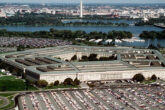October 06, 2020
It’s Time for the Pentagon To Take Data Principles More Seriously
Since 1996, China’s military has beaten countless U.S. forecasts for how long it would take it to develop and field new weapon systems. By comparison, the U.S. military has lagged in its military modernization even as it receives increasing attention and resources. In this context, Vice Chairman Gen. John Hyten’s comment that the Defense Department will take the next 10 years to manage its data effectively should disturb U.S. policymakers and mobilize them to act.
While this timeline may seem forgivable given the magnitude of the Defense Department’s data management problem, decades’ worth of data debt, and dearth of data expertise, it’s nonetheless woefully inadequate. It also helps explain why the U.S. military has an eroding military advantage relative to China’s military forces.
Defense leaders should create the policies, processes, and programs to turn data into useful information quickly and accurately.
As two people intimately engaged in these problems in the private sector, we understand the potential for data to enable better and faster national security decisions on its own and especially when augmented by artificial intelligence (AI) systems. It informs — or should inform — nearly every decision that the Defense Department makes, from business decisions that govern its ~$700 billion annual budget, to intelligence decisions that seek to understand the environment in which the U.S. military competes, to operational decisions that keep the peace and, if necessary, win the nation’s wars.
Read the full article from War on the Rocks.
More from CNAS
-
DEFAERO Strategy Series [Apr 09, 25] CNAS' Becca Wasser and Phil Sheers on Revitalizing the U.S. Defense Industrial Base
On this episode of the Defense & Aerospace Report Strategy Series, sponsored by General Atomics Aeronautical Systems, Becca Wasser and Phil Sheers of the Center for a New Amer...
By Becca Wasser & Philip Sheers
-
From Production Lines to Front Lines
Executive Summary The U.S. defense industrial base (DIB) is struggling to meet the demands of the current strategic environment—let alone prepare for a potential conflict agai...
By Becca Wasser & Philip Sheers
-
The Pentagon’s Endangered Brain Trust
In this environment, sound assessments of emerging threats and new ideas to counter them will be especially vital....
By Dr. Andrew Krepinevich, Jr.
-
Siliconsciousness: The AI Competition: Public Policy Strategies: Part 1
This episode comprises the first part of our special event, “The AI Competition: Public Policy Strategies”. The event, co-hosted by MIT Technology Review, brings together some...
By Dr. ED McGrady




